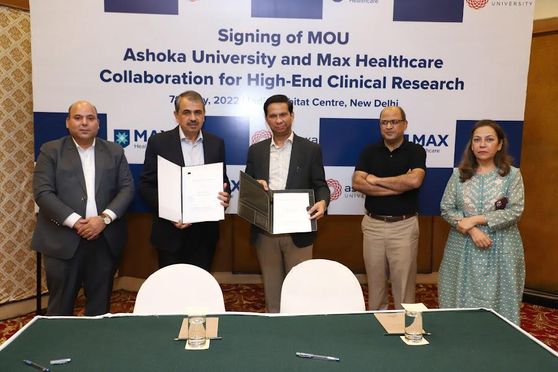Ashoka University signs MoU with Max Healthcare to study complex diseases


Ashoka University has signed a Memorandum of Understanding (MoU) with healthcare provider Max Healthcare Institute Ltd (MHIL) to initiate long-term, high-quality research collaborations on clinically relevant diseases.
L.S. Shashidhara, the dean of research and professor of Biology, and Sachin Sharma, the registrar of Ashoka University, signed the MoU with Sandeep Budhiraja, group medical director, and Mradul Kaushik, senior director (operations and planning) and COO of Max Healthcare, at India Habitat Centre, New Delhi, on May 7.
The collaboration aims to build a joint research programme on genome analysis and data analysis, including AI, ML and deep learning of various genetic and lifestyle diseases such as cancer, asthma, diabetes, hypertension, heart failure, kidney problems, autoimmune diseases and chronic metabolic disorders. Ashoka University claims that it is the first-of-its kind project undertaken by both institutions.
The partnership aims at advancing interdisciplinary research to accelerate the development of lifesaving prevention, treatment and management tools and solutions against the diseases that are of public health priority in India, through joint research activities and academic interchanges.
“There is a lot to discover in the field of genetic and lifestyle diseases. With the coming of Data Science and Genomics, it has the potential to provide efficient, cost-effective solutions and transform the way we look at modern medicine. It will open immense opportunities in research under this collaboration with Ashoka University, which is aiming to solve important scientific problems,” said Sandeep Budhiraja, group medical director, Max Healthcare.
Max Healthcare will provide its expertise in clinical research in human subjects and serve as the clinical centre for data and/or sample collection from individuals who would agree and give their written consent to volunteer to share their data for the purpose of research studies. The data samples provided by Max Healthcare will be used for further processing and analysis.
Malabika Sarkar, vice-chancellor, Ashoka University, described the collaboration as a critical milestone for Ashoka University. “As a university committed to health research as one of its major focus areas, this collaborative agreement which will enable research with clinicians and the opportunity to train large number of people to help the nation to systematically support healthcare is an exciting step forward. With excellent academic programmes at various levels at Ashoka, I am confident that our collaboration with the Max Healthcare will further strengthen research, education and training in health science research at Ashoka,” she said.
Ashoka University will provide its expertise in data analysis, biomedical research and public health expertise in data collection, data analysis and sharing in research. It will further ensure access to network of scientists, academicians, data analysts, public health experts, students, clinical data, equipment technology platforms, core facilities and engagement with relevant industries, start-ups, innovation centres and other relevant Indian institutions for accelerating joint research initiatives.
Ashoka will also arrange for a series of structured joint workshops, mentoring programmes and academia-industry interactions for capacity- building and formulation and conduct of research and publications using the technology and information gathered from joint projects.
Apart from research, the institutions will also explore the possibility of conducting joint training, fellowships, exchange visits, knowledge and technology transfer for cross-learning and capacity-building to build leaders in the fields of biomedical science and arenas of public health. The partnership will also facilitate knowledge-sharing and communication among scientists, epidemiologists and other stakeholders having mutual interest in the discipline. Both the organisations have committed to research for public good and will adhere to applicable statutes, regulations and policies and uphold highest levels of research ethics.